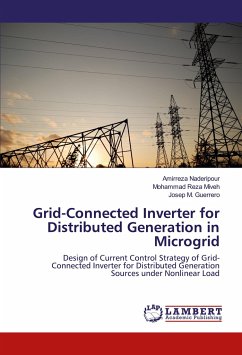The need to increase access to electricity has played a significant role in economic and technical growth within international development. In this respect, Distributed Generation Sources (DGSs) have become more important in recent years for supplementing traditional fossil energy resources for power generation. DGS units can operate in parallel to the main grid or in a Microgrid (MG) mode. An MG is a discrete energy system consisting of DGSs and loads capable of operating in parallel with, or independently from, the main grid. Meanwhile, Grid-Connected Inverters (GCIs) are typically used as the interfaces to connect each source to the common bus in an MG and are usually connected in parallel. This book addresses the design, implementation and analysis of a proposed control method of a three-phase GCI, where the inputs are DGSs, such as an MT and a PV array in MG and implement one based on MATLAB/Simulink and IEEE standards.
Hinweis: Dieser Artikel kann nur an eine deutsche Lieferadresse ausgeliefert werden.
Hinweis: Dieser Artikel kann nur an eine deutsche Lieferadresse ausgeliefert werden.








